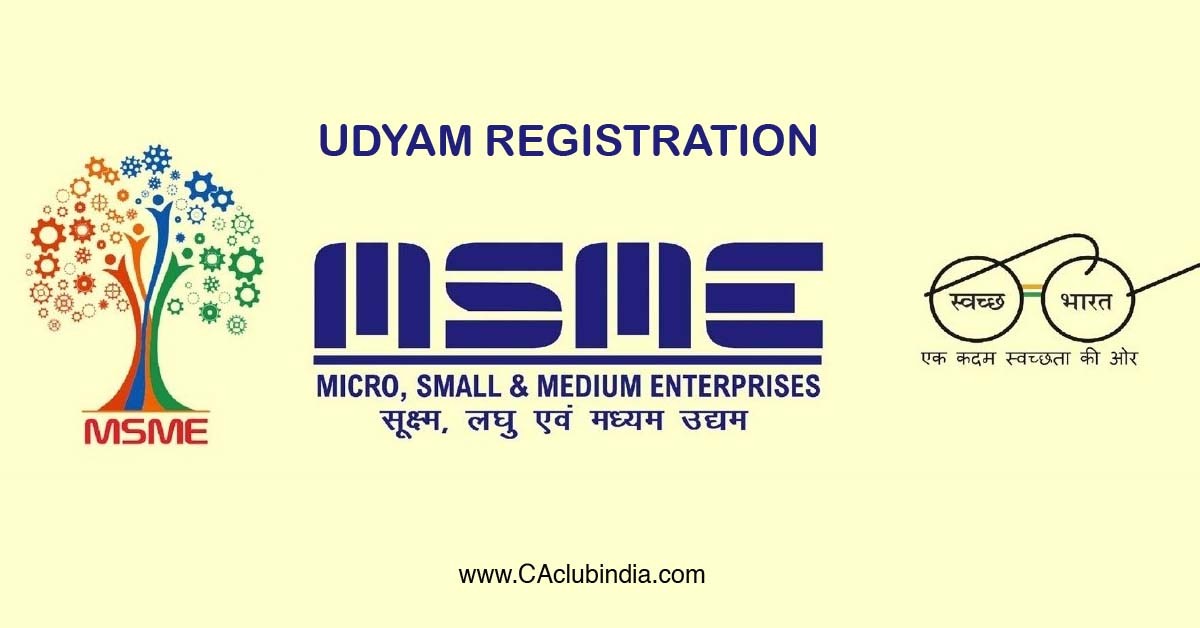"A Good intention with a bad approach often leads to a poor result". Covid has impacted almost all the sectors of the economy but the micro, small and medium enterprises (MSME) seem to be the worst affected. Various survey reports estimate the loss in revenue for this sector to the tune of 30-50 per cent and given their fragile scale and vulnerable position, the damage is serious.
The government's helping hand through initiatives like bank guarantees, loan moratoriums, etc. have provided some relief but they are far from what is actually needed on the ground level. In continuing with the reform agenda, the MSME Ministry has introduced a new scheme "UDYAM" to improve access to assisted schemes.
Origination: UDYAM is an "online only" registration which provides for classification of units engaged in manufacturing and service sector into Micro Small Medium Enterprises based on investment and turnover. The scheme links both income tax and GST returns for assessing eligible turnover and investment criteria. Formerly known as UDYOG AADHAR MEMORANDUM, (UAM). However, in July 2020, the UAM was substituted by UDYAM.
The MSME Development Act was introduced to facilitate the development and enhance the competitiveness of MSMEs. Subsequent to this, various enabling regulations like amendments to income tax forms, GST concessions, banking norms, etc. were introduced to foster their growth.

What does Micro, Small and Medium Enterprise Mean
| Enterprise | Turnover | Investment |
| Micro | Not more than 5 Cr. | Not more than 1 Cr. |
| Small | Not more than 50 Cr. | Not more than 10 Cr. |
| Medium | Not more than 250 Cr. | Not more than 50 Cr. |
Who can apply for UDYAM Registration
- Proprietorship
- Hindu Undivided Family (HUF)
- One Person Company (OPC)
- Partnership firm
- Limited liability partnership (LLP)
- Private limited or limited company
- Co-operative Societies or
- Any association of persons
Glaring Concerns
- Traders have been excluded from the purview of the MSME definition, consequently eliminating nearly 2.3 crore entities (36 per cent) from the landscape. Scheduled commercial banks had sanctioned limits of nearly Rs. 11.5 lakh crore to 1.25 crore traders (wholesale and retail) (March 21), all these limits would now have to be reviewed in terms of pricing and eligibility in the absence of Primary Sector Lending tag.
- Banks may not be inclined to lend small ticket loans to traders citing commercial reasons affecting financial inclusion and forcing the traders to resort to high-cost informal borrowings.
- The government ruling mandates MSMEs to file tax returns even though they may not otherwise be required to file under the respective fiscal laws. In a country where nearly 99.4 per cent of MSMEs are micro enterprises and just a small percentage of the population actually paying taxes, this expectation seems far fetched.
- Registration under the UDYAM scheme is entirely online, and in a country where nearly half the population lack access to internet and more than half of the MSMEs (51.4 per cent) located in rural areas, this expectation seems far from ground reality and not practically possible.
- Collection of data for expansion of access to welfare schemes is an important requirement for eradicating inequality in distribution of income and wealth; however, it should not come at the cost of practicality or undue hardship especially in a year of pandemic. Policy initiatives with a forward-looking approach are the need of the hour, but the same needs to be done after putting in the desired infrastructure in place.
Benefits of UDYAM
- Collateral free loans from banks
- Protection against delayed payments, against material/services supplied
- Special beneficial reservation policies in the manufacturing/ production sector
- Ease of obtaining registrations, licenses, and approvals.
- MSME Registered entity gets eligible for CLCSS (credit linked capital subsidy scheme)
- International trade fair special consideration
- Government security deposit (EMD) waiver (Useful while participating tenders)
- Electricity bills concession
- Stamp duty and registration fees waiver
- ISO certification fees reimbursement
- Direct tax laws rules exemption
- NSIC performance and credit rating fees subsidy
- Patent registration subsidy
- Barcode registration subsidy
- Helps in getting government tenders.
Author's View
Government should expand the definition of MSME to include traders, accept self-declaration (in lieu of tax returns) and make the registration mandatory over a 24-36 month period to make transitions smooth and seamless. After all, "the best public policy is made when you are listening to people who are going to be impacted".
With multiple benefits and at the same time having major glaring concerns it is still a debatable issue and does not leads to a crystal clear picture of whether it is a Boon or Bane.
Every effort has been taken to provide an insight about this topic and to cover all important areas of it, any suggestions and improvements will be welcomed and highly appreciated.









 CAclubindia
CAclubindia
